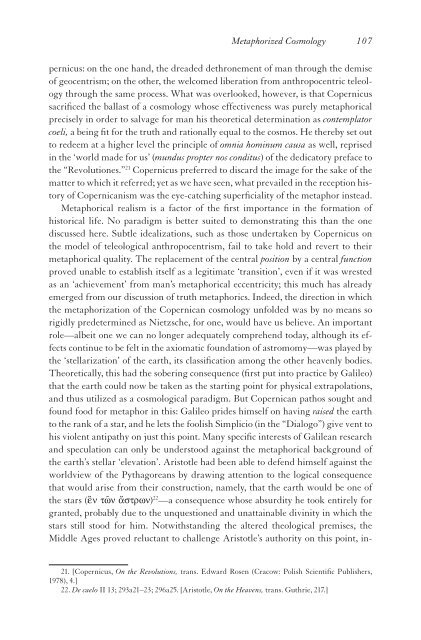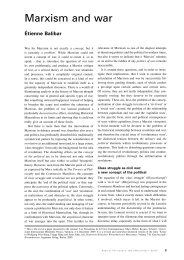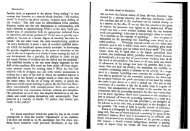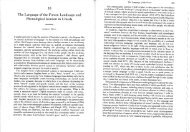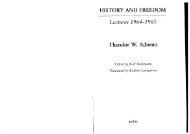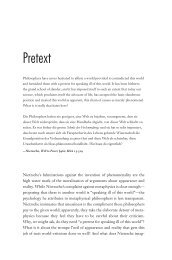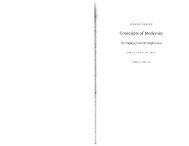Paradigms for a metaphorology.pdf - Townsend Humanities Lab
Paradigms for a metaphorology.pdf - Townsend Humanities Lab
Paradigms for a metaphorology.pdf - Townsend Humanities Lab
Create successful ePaper yourself
Turn your PDF publications into a flip-book with our unique Google optimized e-Paper software.
Metaphorized Cosmology 107<br />
pernicus: on the one hand, the dreaded dethronement of man through the demise<br />
of geocentrism; on the other, the welcomed liberation from anthropocentric teleology<br />
through the same process. What was overlooked, however, is that Copernicus<br />
sacrificed the ballast of a cosmology whose effectiveness was purely metaphorical<br />
precisely in order to salvage <strong>for</strong> man his theoretical determination as contemplator<br />
coeli, a being fit <strong>for</strong> the truth and rationally equal to the cosmos. He thereby set out<br />
to redeem at a higher level the principle of omnia hominum causa as well, reprised<br />
in the ‘world made <strong>for</strong> us’ (mundus propter nos conditus) of the dedicatory preface to<br />
the “Revolutiones.” 21 Copernicus preferred to discard the image <strong>for</strong> the sake of the<br />
matter to which it referred; yet as we have seen, what prevailed in the reception history<br />
of Copernicanism was the eye-catching superficiality of the metaphor instead.<br />
Metaphorical realism is a factor of the first importance in the <strong>for</strong>mation of<br />
historical life. No paradigm is better suited to demonstrating this than the one<br />
discussed here. Subtle idealizations, such as those undertaken by Copernicus on<br />
the model of teleological anthropocentrism, fail to take hold and revert to their<br />
metaphorical quality. The replacement of the central position by a central function<br />
proved unable to establish itself as a legitimate ‘transition’, even if it was wrested<br />
as an ‘achievement’ from man’s metaphorical eccentricity; this much has already<br />
emerged from our discussion of truth metaphorics. Indeed, the direction in which<br />
the metaphorization of the Copernican cosmology unfolded was by no means so<br />
rigidly predetermined as Nietzsche, <strong>for</strong> one, would have us believe. An important<br />
role—albeit one we can no longer adequately comprehend today, although its effects<br />
continue to be felt in the axiomatic foundation of astromomy—was played by<br />
the ‘stellarization’ of the earth, its classification among the other heavenly bodies.<br />
Theoretically, this had the sobering consequence (first put into practice by Galileo)<br />
that the earth could now be taken as the starting point <strong>for</strong> physical extrapolations,<br />
and thus utilized as a cosmological paradigm. But Copernican pathos sought and<br />
found food <strong>for</strong> metaphor in this: Galileo prides himself on having raised the earth<br />
to the rank of a star, and he lets the foolish Simplicio (in the “Dialogo”) give vent to<br />
his violent antipathy on just this point. Many specific interests of Galilean research<br />
and speculation can only be understood against the metaphorical background of<br />
the earth’s stellar ‘elevation’. Aristotle had been able to defend himself against the<br />
worldview of the Pythagoreans by drawing attention to the logical consequence<br />
that would arise from their construction, namely, that the earth would be one of<br />
the stars (ἓν τῶν ἄστρων) 22 —a consequence whose absurdity he took entirely <strong>for</strong><br />
granted, probably due to the unquestioned and unattainable divinity in which the<br />
stars still stood <strong>for</strong> him. Notwithstanding the altered theological premises, the<br />
Middle Ages proved reluctant to challenge Aristotle’s authority on this point, in-<br />
21. [Copernicus, On the Revolutions, trans. Edward Rosen (Cracow: Polish Scientific Publishers,<br />
1978), 4.]<br />
22. De caelo II 13; 293a21–23; 296a25. [Aristotle, On the Heavens, trans. Guthrie, 217.]


